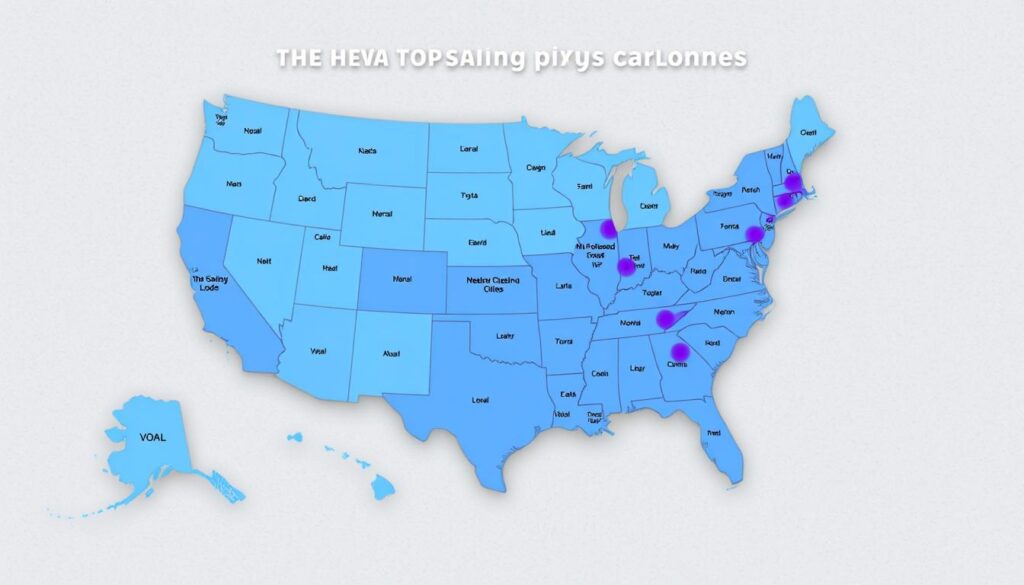Affiliate Disclosure
HVAC Guide Guys is a participant in the Amazon Services LLC Associates Program, an affiliate advertising program designed to provide a means for sites to earn advertising fees by advertising and linking to Amazon.
How Much Money Can You Make Doing HVAC? Ever thought about making a good living in the HVAC field? Could your technical skills lead to a rewarding career? A career that’s stable and has room to grow?

The HVAC industry is a great chance for a strong career with good pay. The U.S. Bureau of Labor Statistics says HVAC techs make about $50,590 a year. The best ones can earn over $80,820.
Let’s explore how much you can earn in HVAC. This guide will cover salary ranges, how pay varies by location, and ways to increase your earnings. You’ll learn how to make the most of your HVAC career.
Key Takeaways
- HVAC technicians can earn between $31,910 and $80,820 annually
- Career advancement significantly impacts earning
- Specialization can lead to higher income opportunities
- Regional differences play a big role in salary ranges
- Certifications can boost your market value
Table of Contents
Understanding HVAC Technician Career Paths
Exploring a career in HVAC opens up exciting opportunities. It’s perfect for those interested in technical skills and steady income. The HVAC industry offers multiple pathways for career growth. With experience and specialization, you can see impressive earnings.
Your journey in the HVAC field starts with entry-level positions. These positions provide critical hands-on training. To kickstart your hvac career income, you’ll need to understand the various stages of professional development.
Entry-Level Positions and Requirements
Starting in the HVAC industry requires specific qualifications:
- High school diploma or equivalent
- Technical training from a vocational school
- Basic understanding of electrical and mechanical systems
- Physical fitness for demanding work environments
Career Progression Opportunities
HVAC professionals can advance through several career stages:
- Apprentice Technician: Initial learning phase
- Journeyman Technician: Advanced skills and certification
- Master Technician: Highest skill level with top earning
Different HVAC Specializations
Specializing can significantly impact your earnings. Key areas include:
- Residential HVAC services
- Commercial system installation
- Industrial climate control
- Green technology solutions
Investing in continuous learning and specialized certifications can dramatically increase your earning in the HVAC industry.
Explore Our HVAC Shop
Looking for top-rated HVAC tools, parts, and accessories? Visit our shop and find the perfect solution for your needs.
Visit the ShopNational Average HVAC Salaries by Experience Level
Learning about hvac salaries is key to planning your HVAC career. Your pay increases as you gain experience and skills.
HVAC pay changes with your career path. New technicians start with less money but have big growth chances.
| Experience Level | Annual Salary Range | Typical Responsibilities |
|---|---|---|
| Entry-Level (0-2 years) | $35,000 – $45,000 | Basic installations, assist senior technicians |
| Mid-Level (3-5 years) | $48,000 – $58,000 | Independent service calls, complex repairs |
| Experienced (6-10 years) | $60,000 – $75,000 | Advanced diagnostics, team leadership |
| Senior Technician (10+ years) | $75,000 – $90,000 | Project management, specialized consulting |
Your hvac salaries can increase through:
- Continuous professional development
- Advanced certifications
- Specialization in commercial or industrial systems
- Geographic location
Pro tip: Invest in your skills to maximize your hvac wages and career.
How Much Money Can You Make Doing HVAC: State-by-State Breakdown
How much you can earn in HVAC work changes a lot from state to state. Where you live can really affect your salary. Some places pay a lot more than others.
Highest Paying States for HVAC Professionals
Some states pay HVAC techs a lot more than others. Here are the top ones:
- Alaska: Averaging $75,660 annually
- Massachusetts: Reaching $73,300 per year
- New Jersey: Offers around $70,500 annually
- California: Has competitive salaries of about $68,900
- Washington: Averages $67,500 yearly
Lowest Paying States for HVAC Technicians
But, some states pay less for HVAC work:
- West Virginia: About $49,200 annually
- Mississippi: Around $49,500 per year
- Wyoming: Averages $49,600 yearly
- Arkansas: Reaches about $52,000
- South Dakota: Offers near $53,000 annually
Regional Salary Variations
Your earnings in HVAC aren’t just about the state. Cities usually pay more than rural areas. Places with lots of construction and industry pay better.
“Location can be a game-changer in your HVAC career earnings. Strategic positioning can dramatically increase your income.” – HVAC Industry Expert
Many things affect how much you earn in different places. These include the local economy, cost of living, demand for HVAC services, and the complexity of jobs.
Explore Our HVAC Shop
Looking for top-rated HVAC tools, parts, and accessories? Visit our shop and find the perfect solution for your needs.
Visit the ShopTop-Paying Cities for HVAC Technicians

If you’re looking for high-paying HVAC jobs, where you live matters a lot. Some cities pay HVAC techs much more than others. This makes for great career and financial opportunities.
Top cities for HVAC techs offer great pay that matches local needs and economy. These jobs can really boost your career and money situation.
| City | Average Annual Salary | Key Factors |
|---|---|---|
| San Francisco, CA | $64,200 | Tech industry growth, high cost of living |
| New York City, NY | $60,600 | Dense urban infrastructure, commercial demand |
| Newark, NJ | $59,900 | Industrial sector, proximity to major markets |
| Boston, MA | $57,800 | Education and healthcare facilities |
| Washington, DC | $56,500 | Government and commercial buildings |
Remember, higher salaries in these cities might mean higher living costs. Planning your career wisely means balancing earnings with life quality.
“Location can be a game-changer in your HVAC career. Choose wisely and invest in your professional growth.” – HVAC Career Advisor
- Research local market conditions
- Consider cost of living adjustments
- Evaluate long-term career prospects
- Network with local HVAC professionals
Success in HVAC jobs starts with knowing the best places and planning your career well.
Commercial vs Residential HVAC Salary Comparison
The HVAC world has two main paths: commercial and residential. Each offers different chances for technicians to make more money.
HVAC careers differ a lot between commercial and residential areas. Knowing these differences helps you plan your career better and increase your earnings.
Commercial HVAC Opportunities
Commercial HVAC techs often make more because of the complex systems they work on. They handle big, advanced systems in places like:
- Office buildings
- Industrial complexes
- Healthcare facilities
- Educational institutions
“Specialization in commercial HVAC can significantly boost your income and career trajectory.” – HVAC Industry Expert
Residential Service Income
Residential HVAC techs work on home systems. They might earn less than commercial techs but have benefits like:
- More consistent work
- Flexible scheduling
- Lower initial investment in tools
- Potential for personal customer relationships
Specialization Benefits
Being an expert in certain HVAC areas can really help your finances. Green technology and smart home systems are in high demand and pay well.
Choosing between commercial and residential HVAC depends on your skills, interests, and career goals. Both paths are good for those who keep learning and specializing.
Factors Affecting HVAC Technician Earnings
Your earnings as an HVAC technician can change a lot. Knowing what affects your pay helps you earn more and grow in your career.
Experience is a big factor in how much you earn. The more you work, the more you’re worth. Beginners start with lower pay, but experienced ones get paid more.
- Years of experience directly correlate with increased earning
- Specialized skills can boost your income a lot
- Advanced certifications open up better-paying jobs
Where you work also affects your pay. Places with harsh weather or lots of building projects pay more. Cities usually offer better pay than countryside areas.
What kind of HVAC work you do also matters. Those who work on big systems like commercial refrigeration or industrial HVAC make more. This is different from those who work on homes.
- Commercial HVAC specialists earn premium rates
- Refrigeration experts command higher wages
- Building automation technicians receive top-tier compensation
Other things that affect your pay include being in a union, getting overtime, and bonuses for good work. Keeping up with new tech can also help you earn more.
Explore Our HVAC Shop
Looking for top-rated HVAC tools, parts, and accessories? Visit our shop and find the perfect solution for your needs.
Visit the ShopCertification Impact on HVAC Salaries
Getting the right certifications can really boost your hvac income. These credentials show you’re an expert and can raise your hvac salaries. They’re a key part of growing your career.
Knowing which certifications are most important can help you move up in your HVAC career. This can also increase your earnings.
Essential HVAC Certifications
Some certifications are key to being seen as credible in the HVAC field:
- EPA 608 Certification: Needed for working with refrigerants
- NATE (North American Technician Excellence) Certification
- State-specific licensing credentials
Advanced Certification Benefits
Specialized certifications can really up your market value. Technicians with these advanced credentials often earn more and get better job offers.
| Certification | Potential Salary Increase |
|---|---|
| NATE Professional Level | 10-15% Salary Boost |
| Manufacturer-Specific Training | 5-10% Salary Increase |
| Advanced Energy Efficiency Cert | 8-12% Earning Increase |
Specialized Training ROI
Investing in your career through targeted certifications can pay off big time. Choosing the right certifications means you’re making a smart investment in your future.
- Average certification cost: $100-$500
- Potential annual salary increase: $2,000-$5,000
- Typical ROI timeframe: 6-12 months
By always improving your skills and getting the right certifications, you become a top choice in the HVAC industry.
HVAC Business Ownership Income

Starting an HVAC business is a top choice for making good money. Experienced technicians can turn their skills into big financial gains by becoming their own bosses. This path offers earnings much higher than regular jobs.
To start an HVAC business, you need a solid plan and some money to invest. Your success depends on a few key things:
- Getting the right state licenses
- Creating a detailed business plan
- Finding the initial funds
- Building a loyal customer base
HVAC businesses can make a lot of money, with some earning six-figure annual revenues. To be profitable, focus on:
- Running your business well
- Marketing smartly
- Providing top-notch customer service
- Keeping your skills sharp
Business owners often make 30-50% more than those working for someone else. Your earnings grow as you add more services, hire more staff, and build a good reputation.
Success in HVAC business needs hard work, technical skills, and business smarts.
While there are hurdles, hardworking people can build thriving HVAC businesses. These businesses offer great financial rewards and personal fulfillment.
Explore Our HVAC Shop
Looking for top-rated HVAC tools, parts, and accessories? Visit our shop and find the perfect solution for your needs.
Visit the ShopOvertime and Bonus Compensation in HVAC
HVAC technicians can earn more than just their regular pay. The demand for HVAC services goes up in certain seasons. This means more chances for overtime and bonuses.
There’s more to earning in HVAC than just your base salary. Summer and winter are peak times for HVAC work. Companies often give extra pay for hard work and great results.
- Overtime rates are usually 1.5x to 2x your regular pay
- Emergency calls get you extra money
- Bonuses can add 5-15% to your yearly income
To make more money in HVAC, try these strategies:
- Learn specialized skills that are in demand
- Be ready to work more during busy seasons
- Show you’re reliable and do quality work
“In HVAC, your earning power grows with your skills and willingness to take on tough jobs.” – Industry Expert
Some companies give extra pay for things like:
- Happy customers
- Referrals
- Profit-sharing
- Year-end rewards
Knowing how to take advantage of these chances can really boost your earnings as an HVAC tech.
Conclusion
The HVAC industry is exciting and offers good money for those who invest in their skills. How much you can earn depends on your expertise, where you work, and what you specialize in. Your career in HVAC is not just about money—it’s about building a lasting and exciting career.
To make more money, focus on growing your career. Every step, from starting out to getting advanced certifications, can boost your income. Specializing in commercial systems, getting more training, or even starting your own business can really increase your earnings.
The need for skilled HVAC technicians is growing fast. This is because of new technology and a focus on saving energy. By keeping up with trends, learning always, and having a wide range of skills, you can set yourself up for success. Your hard work in growing your career will lead to better jobs and higher pay in this changing field.
As you move forward in your HVAC career, remember that your success comes from your hard work, skills, and ability to adapt. Whether you’re just starting or looking to move up, the HVAC industry has many chances for those who are ready to work hard and aim for excellence.

